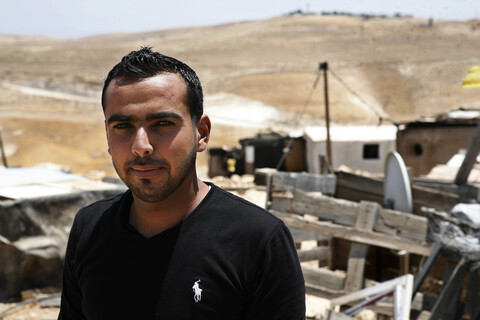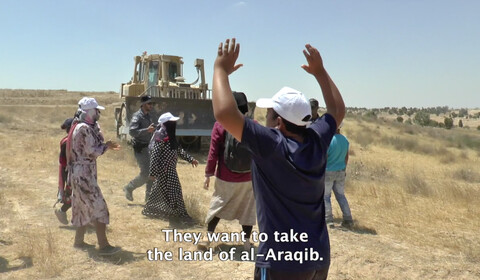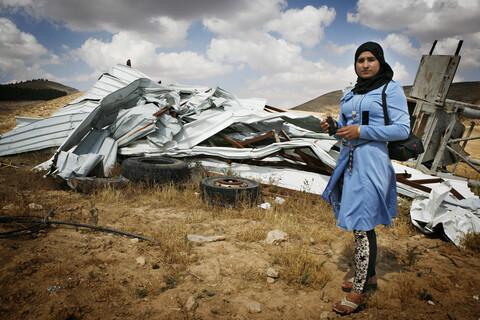The Electronic Intifada Jerusalem 21 June 2016

The traditional Ramadan lantern, seen here in Jerusalem, is believed to have originated in Egypt during the Fatimid period. The legend goes that the people of Egypt held lanterns to light the dark streets and greet the Caliph al-Muizz upon his arrival to Cairo during Ramadan.
Muslims around the world began the month of Ramadan — a period of prayer, charity and communion — in early June.
For Muslims in the northern hemisphere, the holy month overlaps with the summer solstice, the longest day of the year. Those who observe Ramadan abstain from consuming food and drink during the daylight hours.
In Palestine, the fast begins with fajr prayer, just before 4am, and ends with the maghrib prayer at approximately 7:45pm.
It is customary for worshipers to attend Friday prayers at East Jerusalem’s al-Aqsa mosque, one of the holiest sites in Islam. But Israeli restrictions make it impossible for most Palestinians in the occupied West Bank and Gaza Strip to pray there.
In an act of collective punishment following a deadly shooting attack in Tel Aviv on 8 June, Israel suspended more than 83,000 permits issued for the occasion of Ramadan, the majority for family visits in Israel, according to the United Nations monitoring group OCHA.
On the first Friday of Ramadan, 10 June, Israel limited entrance to Jerusalem to 30,000 Palestinians holding West Bank IDs.
Ramadan sees the city transformed by light displays, street vendors and fireworks — if only temporarily. Israeli restrictions, however, have left the Palestinian community in East Jerusalem increasingly isolated and prevented tens of thousands of Palestinians from enjoying the evening’s events.
Silvia Boarini is a photojournalist based in Bir al-Saba and is currently working on a documentary about Naqab Bedouins.

Colorful Ramadan lights adorn the Via Dolorosa in Jerusalem’s Old City. It is tradition that each neighborhood in the Old City’s Muslim quarter compete for most impressive light display during Ramadan.

Um Samer and her daughters have successfully crossed Qalandiya, an Israeli military checkpoint where soldiers prevent free movement between Ramallah and Jerusalem. They have traveled from Nablus, in the northern West Bank, to pray at al-Aqsa. “Ramadan is the time when the first verses of the Quran were revealed to the Prophet [Muhammad], peace be upon him. It’s a very special time, my favorite time. Making this journey to al-Aqsa for us is central to our experience; it’s a way to be closer to God,” Um Samer said.

Raed Hamdan, leader of the Qalandiya camp scouts, helps worshipers negotiate the checkpoint, offering assistance to the elderly and people with disabilities. “Ramadan makes us a little bit closer to God, makes us forget our troubles and concentrate on God. Also it makes us closer to the poor. When we fast we feel with them when they don’t have enough to eat. … My mother is Christian, my father is Muslim, we were brought up Muslim but there is no difference here, no problem, it’s normal in Palestine.”

Worshipers make their way past Israeli forces, deployed in large numbers, in the Old City of Jerusalem.

At al-Asal Sweets in the Old City of Jerusalem, the staff foresees a quiet Ramadan with fewer Palestinians from the West Bank making the pilgrimage to the city for Friday prayers.

A street vendor in the Old City sells falafel mahshi, a Ramadan specialty made with ground chickpeas and stuffed with onions, sumac and other spices, then fried and sprinkled with sesame seeds.

After Friday prayers, the Old City’s narrow streets are packed with the faithful making their way out of Jerusalem. Palestinians who crossed into Jerusalem from elsewhere in the West Bank are required to travel back shortly after prayers.

Following Friday prayers, worshipers pour out of the Old City gates to catch their buses to various destinations across the West Bank.

Palestine Red Crescent Society (PRCS) paramedic Nader Murrar said that turnout at the Qalandiya checkpoint was low on the first Friday of Ramadan for fear of reprisals following the shootings in Tel Aviv. “People are staying home. They feel threatened, they don’t know what to expect,” he said. Asked what Ramadan means to him as a Muslim, he answered, “It’s our holy month; if we fast, pray and follow the Quran, we will gain forgiveness for our sins. It’s also a time to be close to our families, to spend time together, break the fast together, visit our relatives and care about each other.”

A worker takes a nap on a shop’s display while Israeli forces patrol the streets in Jerusalem’s Old City.

A lonely pedestrian in the narrow alleyways of the Old City as families break their fast after sundown.

Shopkeepers cover their displays while they take leave to break the fast.

The streets of East Jerusalem are quiet and empty as families break the fast.

In previous years the Damascus Gate to the Old City has been the heart of East Jerusalem’s nightlife during Ramadan, filled with street vendors selling pancakes, grilled meat sandwiches and sweets. This year the Israeli-controlled municipality did not grant permits to vendors allowing them to sell their wares at Damascus Gate, the site of several attacks and alleged attacks in recent months, as well as protests, and now the steps stand empty.

Lights reading “God is greatest” brighten the Muslim quarter of Jerusalem’s Old City.





